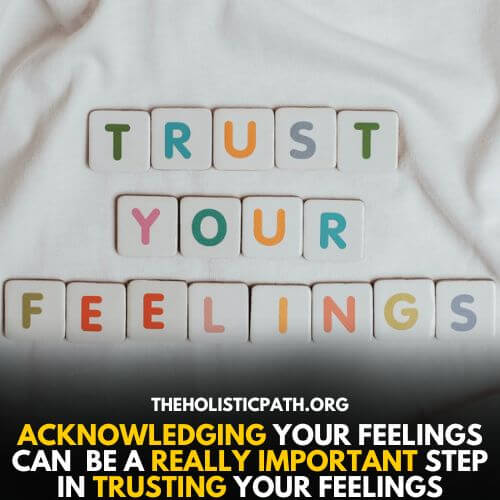Imagine for a moment that you’re facing a choice. You can either trust your feelings or trust your head. Which would you choose? If you’re like most people, you probably trust your head more than your feelings.
After all, our culture values logic and reasoning above all else. But what if I told you that your feelings are actually a better guide than your head? In this article, we’ll explore the idea of trust your feelings and why it’s often the better choice.
So if you’re ready to learn more about trust your feelings, read on!
What Is Meant By Trust Your Feelings
We’ve all been there before – second-guessing ourselves and wondering if we’re making the right decision. We may even consult others for their opinion,
but in the end, we always have to trust our own gut.
Trusting your feelings means that you rely on your instincts or intuition to guide you in your decision-making. It’s about listening to your heart and following your gut instinct instead of overthinking things.

When you trust your feelings, you’re not second-guessing yourself all the time. You’re confident in your choices and trust that you know what’s best for you. This doesn’t mean that you never make mistakes, but it does mean that you’re more likely to trust your own judgment.
How Do You Trust Your Feelings?
As humans, we are constantly bombarded with stimuli from the world around us. It can be difficult to sort through all of the noise and figure out what we should pay attention to and what we should ignore.
Oftentimes, our feelings can be a helpful guide in this process. However, it can be difficult to trust our feelings, especially if we have been taught to second-guess them. Below are some steps that can be helpful in learning to trust your feelings:
- Pay attention to your body. Our bodies can often pick up on things that our minds haven’t registered yet. If you suddenly feel tense or anxious for no apparent reason, there may be something going on that you’re not aware of.
- Check in with your intuition. Intuition is that “gut feeling” we sometimes get about a person or situation. It’s often based on non-verbal cues that we’ve picked up on but haven’t consciously processed. If you get a bad feeling about something, trust it and take action accordingly.
- Listen to your emotions. Emotions are a powerful source of information. They can tell us when something isn’t right, even if we don’t know why. If you’re feeling scared or angry or sad, trust those emotions and take action accordingly.
Learning to trust your feelings can be a helpful way to navigate the world around you. By paying attention to your body, listening to your intuition, and following your emotions, you can learn to trust your feelings and make decisions accordingly.
Trusting Your Feelings Is Difficult For You
1. You suppress your emotions:
When you bottle up your emotions, it can lead to all sorts of problems. For one thing, it can be difficult to trust your own feelings when you’re used to ignoring them. If you’re constantly telling yourself to “just suck it up” or “stop being so sensitive,” it can be tough to trust that your feelings are valid.
After all, if you’ve been told your whole life that your emotions are wrong or unwanted, it’s easy to start believing it. This can lead to all sorts of problems, from anxiety and depression to difficulty forming attachments and trust issues.
So if you’re feeling overwhelmed or like you’re constantly holding something back, it might be time to let yourself feel again. It might be messy and uncomfortable, but ultimately it’s worth it.
2. Current Feelings Awken The Old Feelings:
It’s human nature to trust your feelings. After all, they’re what help you navigate the world and make decisions. But there are times when your old feelings can come back to haunt you, causing you to second-guess your current ones. This can happen for a variety of reasons.
Maybe you had a bad experience in the past that’s made you wary of trusting your gut. Or maybe you’ve been through a lot of change lately and it’s left you feeling unsettled. Whatever the reason, it’s important to remember that your current feelings are valid.
Just because something didn’t work out in the past doesn’t mean it won’t work out now. So go ahead and trust your gut! It’s usually right.
3. Childhood Emotional Neglect:
For many of us, trust is something that has to be earned. We learn early on that we can’t always trust other people to act in our best interests. But what happens when we can’t even trust ourselves?

When we grow up not feeling safe enough to express our true emotions, we may start to doubt our own instincts and feelings. Over time, this can lead to a sense of disconnection from our own emotions and inner experiences. If you find yourself struggling to trust your feelings, it may be because you experienced emotional neglect during childhood.
Emotional neglect is a subtle form of abuse that can be hard to spot. It arises when caregivers fail to respond to a child’s emotional needs in a consistent or supportive way. This can leave children feeling unheard, unimportant, and alone.
As adults, we may then find it difficult to trust ourselves because we never learned that our feelings are valid or worth listening to. As a result, you start second-guessing yourself and dismissing your own instincts and emotions.
If you want to learn to trust your feelings again, it may be helpful to seek out therapy or counseling. A therapist can provide support and guidance as you begin the process of building a new relationship with your emotions.
10 Reasons Why You Can’t Trust Your Feelings
It’s not always easy to trust your feelings. After all, feelings can be unpredictable and often hard to understand. Here are 10 reasons why it becomes difficult to trust your feelings:
- You may have been told in the past that your feelings are wrong or that they don’t matter. As a result, you may have learned to distrust your own emotions and instincts.
- You may not be used to listening to or following your feelings. If you’ve always had a more logical or analytical approach to life, it can be hard to start trusting your emotions instead.
- Your feelings can change from day to day or even hour to hour. It can be difficult to trust something that feels so unstable and unpredictable.
- Your feelings may conflict with what other people think or say. It can be confusing and frightening to trust your own emotions if they seem to be different from everyone else’s.
- You may be afraid of feeling hurt or disappointed if you trust your emotions and they turn out to be wrong. It’s often easier and safer to just ignore your feelings altogether.
- You may have experienced trauma or abuse in the past, which makes it harder to trust anything, including your own emotions. If you’ve been hurt before, it can be hard to take the risk of trusting yourself again.
- You may have certain beliefs or values that make it difficult to trust your feelings. For example, if you believe that emotions are always irrational or unreliable, it will be very hard to trust them.
- You may feel like you’re not allowed to trust your own emotions. This can happen if you grew up in a family where people didn’t express their feelings freely, or if you live in a culture that stigmatizes certain emotions (such as sadness or anger).
- You may not be used to being in touch with your emotions at all. If you’ve always strived to be “rational” and “steady,” it can be very scary and overwhelming to start listening to your heart instead of your head.
- Trusting your feelings requires courage and vulnerability. It’s not easy to put yourself out there emotionally and let yourself be open and vulnerable with others. But it is possible, and it gets easier with practice.”
10 Gut Feelings You Should Not Ignore
We’ve all been there before. We’re in the middle of a situation and we get a nagging feeling that something isn’t quite right. Maybe it’s a person we’re talking to or a place we’re in. Whatever it is, our gut is telling us to be careful. And yet, we often ignore those warning signs and forge ahead anyway. After all, we reason, what’s the worst that could happen?
The answer, unfortunately, is “plenty.” Our gut feelings are there for a reason. They’re our brain’s way of sending up a red flag and saying “Hey, this doesn’t feel right.”
And when we ignore those warnings, bad things can happen. We might get talked into something we don’t want to do, or end up in a dangerous situation. So next time you get that sinking feeling in your stomach, listen to it. It just might save you from making a big mistake.

Here are ten gut feelings that you should never ignore:
- That feeling that something bad is going to happen – When our intuition is trying to warn us of danger, it’s best to listen. Ignoring those warning signs can lead to disastrous consequences.
- That feeling that something is off about someone – If you get a bad vibe from someone, it’s probably for a good reason. Don’t ignore your instincts – they could be trying to protect you from harm.
- That feeling that you’re not good enough – A lot of people feel like they’re not good enough, but it’s important to push past that feeling and follow your dreams anyway. Ignoring your gut feeling will only lead to regret.
- That feeling that you’re about to make a mistake – We’ve all been there – about to make a decision that we know deep down is a mistake. But instead of ignoring that feeling, listen to it and avoid the regret that comes with making the wrong choice.
- That feeling of being overwhelmed – If you’re starting to feel overwhelmed, it’s important to take a step back and reassess what’s important. Trying to do too much will only lead to burnout.
- That feeling of homesickness – Homesickness is a real phenomenon, and Ignoring it will only make it worse. If you’re missing home, don’t be afraid to reach out and connect with loved ones.
- That feeling of being pulled in too many directions – We all have responsibilities and commitments, but if we’re spread too thin we’ll never be able to give our best to anything. Don’t be afraid to say no occasionally so that you can focus on what’s really important.
- That feeling like you’re stuck in a rut – If you’re not happy with where you are in life, don’t ignore that feeling. Make a change, even if it’s scary. You might be surprised at how good it feels to get out of your comfort zone.
- That feeling like you’re not appreciated – It’s important to feel valued and appreciated in our relationships, whether they’re romantic, platonic, or professional. If you don’t feel appreciated, don’t ignore the problem – address it head-on so that you can either find a solution or move on to better things.
- That gut-wrenching feeling when something bad happens – We all experience heartbreak, loss, and pain at some point in our lives. Instead of numbing those feelings with alcohol or drugs, allow yourself to grieve and heal in whatever way works best for you.”
Benefits Of Trusting Your Feelings
There are many times in life when it is important to trust your feelings. If you have a strong feeling about something, chances are it is based on intuition or gut instinct. These feelings are often more accurate than rational thought, so it is important to listen to them.
Of course, this doesn’t mean that you should act on every feeling you have – sometimes feelings can be based on false assumptions or incomplete information. But if you have a strong, persistent feeling about something, it is worth paying attention to.
Trusting your feelings can help you make better decisions, avoid dangerous situations, and find success in life.
Trusting your feelings can have a lot of benefits. Here are some of the benefits that you may experience if you trust your feelings:
- You will be more in tune with yourself and what you need.
- You will be better able to make decisions that are right for you.
- You will be less likely to second-guess yourself.
- You will be more confident in yourself and your choices.
- You will be more likely to follow your heart and pursue your dreams.
- You will be less stressed and anxious because you will be trusting your intuition instead of overthinking things.
- You will be more present and mindful because you will be trusting your gut instinct instead of getting caught up in your head.
- You will build better relationships because you will be more authentic and honest with yourself and others.
- You will create a life that feels good to you because you will be living according to your values and what feels right for you.
The Four-Step Process for Trusting Feelings
Step 1: Acknowledge your feelings
A lot of the time, we tend to push our feelings down and try to ignore them. We tell ourselves that we’re overreacting, or that we shouldn’t feel that way. However, acknowledging your feelings can actually be a really important step in trusting your feelings.

When you allow yourself to feel what you’re feeling, without judging it or pushing it away, you’re giving yourself permission to trust your own instincts and intuition. Your feelings are there for a reason, and they can often guide you more accurately than your thoughts can.
So next time you’re feeling something strongly, instead of telling yourself to just stop feeling it, try acknowledging it instead. You might be surprised at how much better you feel when you do.
Step 2: Resist judgment and analysis
Sometimes, when we’re faced with a difficult decision, it can be tempting to overthink things. We might second-guess ourselves, or try to analyze the situation from every possible angle.
Resist the urge to do this. It’s important to trust your feelings in these situations. After all, you know yourself better than anyone else does. If something feels off, or like it’s not the right choice for you, then it probably isn’t.
So instead of getting caught up in your head, listen to your heart. It will usually guide you in the right direction.
Step 3: Check in with your body
Check-in with yourself regularly. throughout the day, take a few moments to check in with yourself and see how you’re feeling. This will help you become more aware of your feelings and start trusting them more.
One of the benefits of having a strong connection with your body is that it allows you to trust your feelings. When you know your body well, you can more easily trust the signals it’s sending you. For example, if you’re feeling sick, you’re likely to trust that feeling and take steps to care for yourself.
Or, if you’re feeling tired, you’re more likely to trust that feeling and rest. This is because you know your body and trust that it wouldn’t give you false information. On the other hand, if you’re not in touch with your body, it’s harder to trust the feelings you have. You might second-guess yourself or write off your feelings as being irrational.
However, when you have a strong connection with your body, you can trust that the feelings you have are valid and worth paying attention to.
Step 4: Take action based on your feelings
Trusting your feeling can be a good thing or a bad thing, depending on the situation. If you trust your gut feeling and it leads you astray, then you may end up in a bad situation.
But if you trust your gut feeling and it leads you to success, then you’ll be glad you followed your heart. Sometimes, taking action based on your feelings can be the best thing you can do. Other times, it may not be the best course of action.
But either way, trust your instincts and go with what feels right to you.
How To Trust Your Feelings In Different Situations
How many times have you talked yourself out of something because your gut told you it wasn’t a good idea, only to later find out that you were right all along? We’ve all been there. It’s easy to second-guess ourselves, especially when we’re feeling insecure or when the stakes are high. But the truth is, our feelings are often the best guide we have.

The next time you’re second-guessing yourself, try following these steps:
- First, take a step back and check in with your body. How do you feel physically? Are you tense or relaxed? Pay attention to any areas of tension or discomfort – these can be clues that something isn’t right.
- Next, notice your emotions. What are you feeling? Fear, excitement, joy, anger, sadness? Again, pay attention to anything that feels out of alignment with what you’re used to feeling in similar situations.
- Finally, trust your intuition. What is your gut telling you? Is it telling you to go for it or to back off? Oftentimes, our intuition knows what’s best for us even when our mind doesn’t.
So the next time you’re unsure of what to do, trust your feelings. Chances are they’ll lead you in the right direction.
Move From Indecisiveness To Decisiveness
Indecisiveness can be frustrating. You know what you want to do, but you just can’t seem to make a decision. But trust your feelings. Your gut is usually right. Here are some ways trusting your feelings can help in becoming decisive:
- It grounds you in the present moment instead of overthinking the future.
- You’ll be more likely to make a decision that you’re happy with. If you trust your gut, you’re more likely to make a choice that feels right for you.
- You’ll be less likely to second-guess yourself. When you trust your intuition, you’ll be less likely to question your decisions later on.
- When you trust your feelings, you free up your mental energy to focus on other things instead of dwelling on one choice.
- You become more spontaneous and flexible, which can lead to new and exciting experiences.
- You develop a stronger connection with yourself and learn to listen to your intuition.
So trust your feelings and let them guide you to becoming the decisive person you want to be!
Conclusion
In conclusion, it is important to trust your feelings. Intuition is a powerful thing, and it is there for a reason. Too often, we second-guess ourselves and end up missing out on opportunities or making decisions that we later regret.
If you listen to your gut and trust your instincts, you will be much better off in the long run. So, next time you are feeling unsure about something, don’t be afraid to go with your gut. It just might lead you to exactly where you need to be.
